《She didn't walk to school yesterday》课件
小学英语精讲精析 She didn't walk to school yesterday.
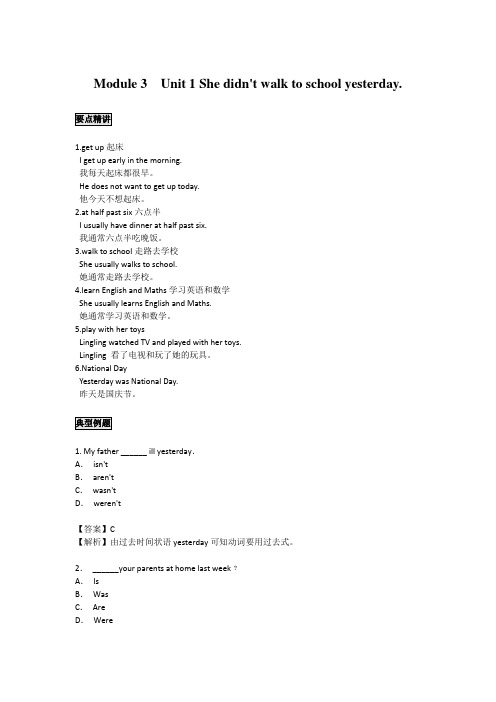
Module 3 Unit 1 She didn't walk to school yesterday.1.get up起床I get up early in the morning.我每天起床都很早。
He does not want to get up today.他今天不想起床。
2.at half past six六点半I usually have dinner at half past six.我通常六点半吃晚饭。
3.walk to school走路去学校She usually walks to school.她通常走路去学校。
4.learn English and Maths学习英语和数学She usually learns English and Maths.她通常学习英语和数学。
5.play with her toysLingling watched TV and played with her toys.Lingling 看了电视和玩了她的玩具。
6.National DayYesterday was National Day.昨天是国庆节。
1. My father ______ ill yesterday.A.isn'tB.aren'tC.wasn'tD.weren't【答案】C【解析】由过去时间状语yesterday可知动词要用过去式。
2.______your parents at home last week﹖A.IsB.WasC.AreD.Were【答案】D【解析】由过去时间状语last week可知动词要用过去式1._____your father at work the day____ yesterday(前天)﹖A.Was; beforeB.Is; beforeC.Was; afterD.Is; after2.—Who was on duty last Friday﹖—_________.A. I amB.I wasC.Yes, I wasD.No, I wasn't。
Module3Unit1Shedidn’twalktoschoolyesterday.(教学设计)-
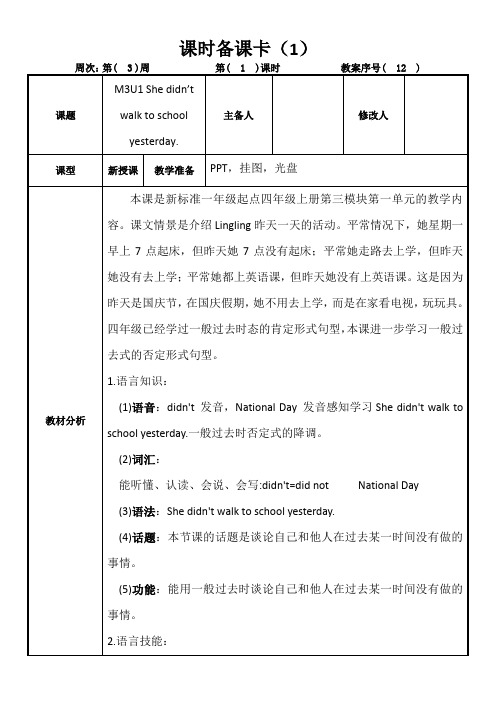
学情分析
知识经验:第二模块学生已经学习了一般过去式动词加ed的用法,本节课将继续学习一般过去式及其否定式。
生活经验:平时过国庆节都会放假,就会有平时要做的事,但是那一周不需要做,学生有生活体验。
策略经验:学生已经掌握小组合作、同桌合作练习等策略,本节课将加入更多活动,学生将运用自然拼读等方式练习单词。
S:Monday
I usually...
presentation
Listen and and answer the question.
(教师板书句子,讲解usually,之后总结规律)
Did Lingling do them yesterday?
find all the sentences that has”didn’t”
课时备课卡(1)
周次:第( 3 )周 第( 1 )课时 教案序号( 12 )
课题
M3U1 She didn’t walk to school yesterday.
主备人
修改人
课型
新授课
教学准备
PPT,挂图,光盘
教材分析
本课是新标准一年级起点四年级上册第三模块第一单元的教学内容。课文情景是介绍Lingling昨天一天的活动。平常情况下,她星期一早上7点起床,但昨天她7点没有起床;平常她走路去上学,但昨天她没有去上学;平常她都上英语课,但昨天她没有上英语课。这是因为昨天是国庆节,在国庆假期,她不用去上学,而是在家看电视,玩玩具。四年级已经学过一般过去时态的肯定形式句型,本课进一步学习一般过去式的否定形式句型。
(4)话题:本节课的话题是谈论自己和他人在过去某一时间没有做的事情。
(5)功能:能用一般过去时谈论自己和他人在过去某一时间没有做的事情。
she didn't walk to school yesterday教学设计
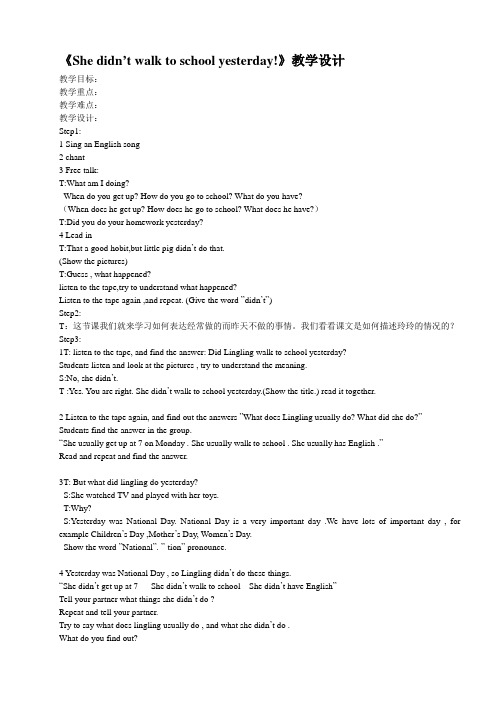
《She didn’t walk to school yesterday!》教学设计教学目标:教学重点:教学难点:教学设计:Step1:1 Sing an English song2 chant3 Free talk:T:What am I doing?When do you get up? How do you go to school? What do you have?(When does he get up? How does he go to school? What does he have?)T:Did you do your homework yesterday?4 Lead inT:That a good hobit,but little pig didn’t do that.(Show the pictures)T:Guess , what happened?listen to the tape,try to understand what happened?Listen to the tape again ,and repeat. (Give the word ”didn’t”)Step2:T:这节课我们就来学习如何表达经常做的而昨天不做的事情。
我们看看课文是如何描述玲玲的情况的?Step3:1T: listen to the tape, and find the answer: Did Lingling walk to school yesterday?Students listen and look at the pictures , try to understand the meaning.S:No, she didn’t.T :Yes. You are right. She didn’t walk to school yesterday.(Show the title.) read it together.2 Listen to the tape again, and find out the answers ”What does Lingling usually do? What did she do?”Students find the answer in the group.“She usually get up at 7 on Monday . She usually walk to school . She usually has English .”Read and repeat and find the answer.3T: But what did lingling do yesterday?S:She watched TV and played with her toys.T:Why?S:Yesterday was National Day. National Day is a very important day .We have lots of important day , for example Children’s Day ,Mother’s Day, Women’s Day.Show the word ”National”.”-tion” pronounce.4 Yesterday was National Day , so Lingling didn’t do these things.“She didn’t get up at 7 She didn’t walk to school She didn’t have English”Tell your partner what things she didn’t do ?Repeat and tell your partner.Try to say what does lingling usually do , and what she didn’t do .What do you find out?didn’t+v. (Write on the blackboard.Step4 practise1 Fill the blanks.2 Mr Smart cooked noodles. Tom helped him. Ms Smart phoned Grandma.Sam watched TV. Amy painted a picture.3 try to retell the text.TStep5 completationTell us about your family , what does she/he usually and what didn’t she do ? For example “my mother usually cooks ,but she didn’t cook yesterday ,she watched TV, yesterday was Mother’s Day.”Step 6 Homework1 retell the text2 write the key sentences.。
Module3 Unit1 She didn’t walk to school yesterday.
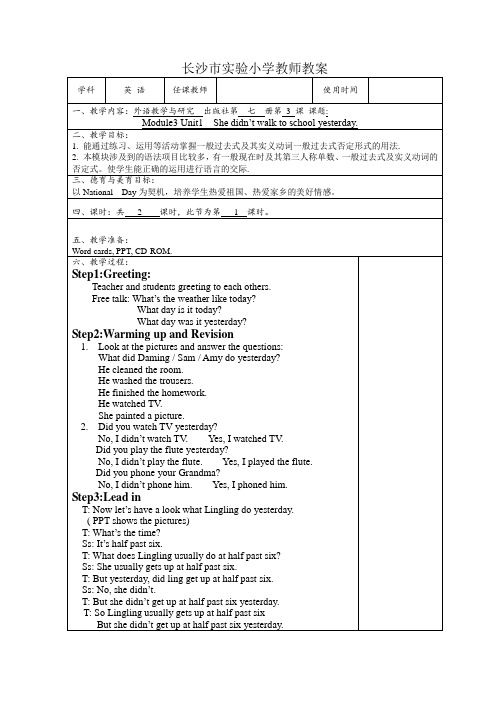
But she didn’t learn English and Maths yesterday.
3. T: Linglng didn’t get up at half past six,
She didn’t walk to school.
Ss: No, she didn’t.
T: But she didn’t walk to school yesterday.
T: So Lingling usually walks to school,
But she didn’t walk to school yesterday.
2. T: What does Lingling usually do ?
长沙市实验小学教师教案
学科
英语
任课教师
使用时间
一、教学内容:外语教学与研究出版社第七册第3课课题:
Module3 Unit1 She didn’t walk to school yeste习、运用等活动掌握一般过去式及其实义动词一般过去式否定形式的用法.
2.本模块涉及到的语法项目比较多,有一般现在时及其第三人称单数、一般过去式及实义动词的否定式。使学生能正确的运用进行语言的交际.
She didn’t learn English and Maths,
Why she didn’t do this?
Ss: Yesterday was National Day!
T: Yes, yesterday was National Day!
So, what did Lingling do yesterday?
四年级上册英语课件- Module3 Unit1 She didn’t walk to school yesterday.外研社(一起)(共17张PPT)
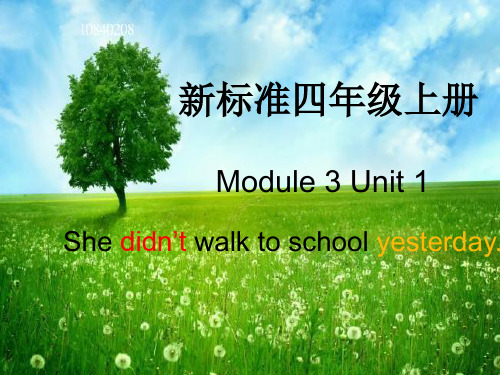
What does Lingling usually do ?
Lingling usually gets up at 7. She usually walks to school . She usually has English at school .
(B)1. Mary usually
to school .
to the zoo .
A . walk B. walks C. walked
(C)3. Tom watched TV and the toys .
A . plays B. play C. played
She played with her toys yesterday. She didn’t get up yesterday. She/He/I/They … ed … yesterday.
Yesterday was/were National Day!
Lingling watched TV and played with her toys .
and 连接前后一致
(B)1. Mary usually
to school .
A . walk BB. walks C. walked
(A)2. Sam didn’t
Did pig finish his homework yesterday?
No, he didn ’t.
Listen and circle didn’t .
But she didn’t get up at 7yesterday.
But she didn’t walk to school yesterday.
She/He/I/They … didn’t… yesterday.
小学英语《She didn't walk to school yesterday》优质教学课件

Linda's Yesterday
Linda is a little girl. She is ten. On Sundays, she ቤተ መጻሕፍቲ ባይዱsually _li_st_e_n_s (listen / listens) to music. But she didn't l_is_t_e_n (listen / listens) to music yesterday.
She usually _ri_d_e_s (ride / rides) her bike. But she didn't r_i_d_e (ride / rides) it yesterday.
She usually _pl_a_y_s (play / plays) with her friend. But she didn't _p_la_y_ (play / plays) yesterday.
Lingling usually _g_e_ts__u_p_a_t__7_ on Mondays.
(get up at 7)
She usually _w_a_l_k_s_t_o_s_c_h_o_o_l_.
(walk to school)
She usually _h_a_s_E_n_g__li_s_h at school.
What did Lingling do yesterday?
Lingling watched TV and played with her toys.
Lingling's Yesterday
Yesterday, Lingling played with with her toys. She didn’t __________.
小学英语新外研版(一起)四年级上册课时M3教案
潍坊市实验小学备课卡
年级
三
学科
英
主备人
赵国丽
应用人
课题
Module 3
Unit 1 She didn’t walk to school yesterday.
教学目标
Teaching aims:
1. Learn the new words: learn National day
板书设计
She didn’t walk to school yesterday.
Labor Day Children’s Day Teacher’s Day New Year
作业设计
Recite the words.
Read the text five times.
教学反思
潍坊市实验小学备课卡
年级
三
学科
英
主备人
赵国丽
应用人
课题
Module 3
Unit 1 She didn’t walk to school yesterday.
教学目标
Teaching aims:
1. Learn the new words: learn National day
2. Learn the sentences: Lingling didn’t get up at half past six.
(1) Did Lingling get up at 6:30 yesterday?
(2) Did Lingling walk to school yesterday?
(3) Did Lingling learn English and Maths yesterday?
英语1She didn't walk to school yesterday-课件
She didn’t walk to school yesterday.
Let’s chant!
watch, watch, watch, I watch TV. clean, clean, clean, I clean my room. get, get, get, I get up. walk, walk, walk, I walk to school.
3. Did Lingling have English at school yesterday? She didn’t have English at school.
Sum-up
1. 叙述Lingling 通常做些什么。 2. 叙述Lingling 昨天与以前有什么不同。
Homework
1. 听录音跟读课文 2. 完成调查表,并用: I usually _________. But I didn’t __________ yesterday.
Yesterday was National Day.
每年的10月1日
Look and answer
1. Did Lingling get up at 7:00 yesterday? She didn’t get up at 7:00.
2. Did Lingling walk to school yesterday? She didn’t walk to school.
Free talk
When do you usually get up? How do you usually go to school?
usually: 通常
watch TV. walk to school. clean my room. learn English.
小学英语新外研版(一起)四年级上册M3U1教案
本课的教学对象是四年级学生。学生在前两个模块中已经学习了一般过去时态的肯定句,了解了一般过去时态肯定句的基本句式结构并能用简单的陈述句描述过去某一时间所发生或做过的事情。本课在此基础上进行否定句的学习,对学生来说应该难度降低了。
教学目标
语言知识
词汇:全体学生能理解运用National Day
She didn’t walk to school yesterday.
全体学生能书写:She didn’t walk to school yesterday.
情感态度
了解国庆节的表达方式,增强祖国意识,培养爱国主义情感。
学习策略
在用英语描述自己和他人的活动过程中将新旧知识联系起来。采用情景教学法,为学生创造真实的情景,鼓励学生采取自主学习策略和小组合作学习策略进行英语交流,让学生有效地跟随真实的语言情境一步一步地完成各个环节的教学任务。
讲授National Day,并强调N和D需要大写。
4.学生自读课文。
5.学生齐读课文。
教学系统M3U1A2动画。
PPT第4-5页
PPT第6-7页
PPT第8-10页
用点读笔播放课文原文,带领学生跟读。
训练巩固
(10分钟)
1.Fill in the blanks.
(1)Lingling usuallygets upat 7 on Mondays.
语法:全体学生能理解运用didn’t=did not
语句:全体学生能运用She didn’t …
语音:全体学生能正确朗读语句,部分学生能流利朗读课文,语音语调正确
功能:谈论他人在过去某一时间没有做的事情
语言技能
全体学生能听懂:课文内容以及老师的常用指令
小学英语新外研版(一起)四年级上册新标准Module3Unit1 She didn't walk to school y (3)教案
小学英语新外研版(一起)四年级上册Unit 1《She didn’t walk to school yesterday.》教案--第一课时教学目标1.语言知识目标:学习目标语句She didn’t walk to school.She didn’t has English yesterday.及单词National Day2.语言技能目标:能口头运用She didn’t ...这一语句谈论过去没有发生的事或行为。
教学重点学习目标语句She didn’t walk to school. She didn’t learn these things yesterday.及单词learn, National Day教学难点能口头运用She didn’t ...这一语句谈论过去没有发生的事或行为。
教学方法情景教学法。
课前准备录音机,小黑板,实物投影,课件, 单词图卡。
课时安排1课时教学过程一、导课Step1Warming-upa. Say the chant of Module2.b. Talk about :What did you do yesterday?学生可能针对自己的实际回答问题:I painted a picture yesterday.I watched TV yesterday.I played computer games yesterday....为了进一步激发学生的学习兴趣可以做个游戏:Guess! What did I do yesterday?让学生表演出他昨天做的一件事.其他学生猜:He/She watched TV…Step2 Presentation1. T: When do you usually get up? How do you usually go to school?引导学生运用正确句式回答。
2. T: When does she usually get up? And how does she usually go to school?教师紧接着出示Lingling的几张图片,引导学生回答问题。
- 1、下载文档前请自行甄别文档内容的完整性,平台不提供额外的编辑、内容补充、找答案等附加服务。
- 2、"仅部分预览"的文档,不可在线预览部分如存在完整性等问题,可反馈申请退款(可完整预览的文档不适用该条件!)。
- 3、如文档侵犯您的权益,请联系客服反馈,我们会尽快为您处理(人工客服工作时间:9:00-18:30)。
1.What did you learn today? 2. Homework: ·Listen ,point and repeat the text. ·Introduce your birthday to your parents.
82.成为一个成功者最重要的条件, 就是每 天精力 充沛的 努力工 作,不 虚掷光 阴。― ―[威廉 ·戴恩·飞利浦] 83.人生成功的秘诀是,当机会来到 时,立 刻抓住 它。― ―[班杰 明·戴 瑞斯李] 84.不停的专心工作,就会成功。― ―[查尔 斯·修 瓦夫]
40.你要确实的掌握每一个问题的核 心,将 工作分 段,并 且适当 的分配 时间。[富兰克 林] 85.每一年,我都更加相信生命的浪 费是在 于:我 们没有 献出爱 ,我们 没有使 用力量 ,我们 表现出 自私的 谨慎, 不去冒 险,避 开痛苦 ,也失 去了快 乐。― ―[约翰 ·B·塔 布]
91.要及时把握梦想,因为梦想一死 ,生命 就如一 只羽翼 受创的 小鸟, 无法飞 翔。― ―[兰斯 顿·休 斯] 92.生活的艺术较像角力的艺术,而 较不像 跳舞的 艺术; 最重要 的是: 站稳脚 步,为 无法预 见的攻 击做准 备。― ―[玛科 斯·奥 雷利阿 斯] 93.在安详静谧的大自然里,确实还 有些使 人烦恼.怀疑.感到压 迫的事 。请你 看看蔚 蓝的天 空和闪 烁的星 星吧!你的心将 会平静 下来。[约翰·纳森·爱 德瓦兹]
Free talk: Today is Monday, what do you usually do?
1. Lead-in.
What about Lingling?
the record.
On Mondays
She usually _g_e_t_s__ _u_p__ at half past six.
Daming usually finishes homework.
But he ______ ______ _____.
Daming usually washes trousers.
But he didn’t ______ ____ _______ yesterday.
Daming usually helps his mom.
并能在实际生活中运用。
1. Greeting.
2.Brainstorm:The purpose is to have students reviewed the verb phrases and aroused their interests.
I
listen to music
watch TV
But he didn’t ______ his mom yesterday.
Yesterday, Lingling played with her toys. She didn’t …
Talk in pairs ,then practice.
Now we are Lingling, can you introduce your National Day to others? (The purpose is to change the pronouns.)
改chant
Why didn’t Lingling walk to school?
Yesterday was National Day!
Arouse ss’ patriotic feeling
What did Lingling do yesterday?
What did Lingling do yesterday? Lingling _____ TV and _____ with her toys.
I usually _____ on Monday. But I didn’t _____last Monday. I usually _____ on Monday. But I didn’t _____last Monday. It was Mid-autumn Day. And I ate the moon cake.
Summary.
For example: She didn’t get up at 7 yesterday. She didn’t walk to school. She didn’t have English at school.
Practice the sentences.
played learned walked rode got up
97.有三个人是我的朋友爱我的人.恨 我的人 .以及 对我冷 漠的人 。 爱我的人教我温柔;恨我的人教我谨 慎;对 我冷漠 的人教 我自立 。――[J·E·丁 格] 98.过去的事已经一去不复返。聪明 的人是 考虑现 在和未 来,根 本无暇 去想过 去的事 。――[英国哲 学家培 根] 99.真正的发现之旅不只是为了寻找 全新的 景色, 也为了 拥有全 新的眼 光。― ―[马塞 尔·普 劳斯特] 100.这个世界总是充满美好的事物 ,然而 能看到 这些美 好事物 的人, 事实上 是少之 又少。 ――[罗 丹] 101.称赞不但对人的感情,而且对 人的理 智也发 生巨大 的作用 ,在这 种令人 愉快的 影响之 下,我 觉得更 加聪明 了,各 种想法 ,以异 常的速 度接连 涌入我 的脑际 。――[托尔斯 泰] 102.人生过程的景观一直在变化, 向前跨 进,就 看到与 初始不 同的景 观,再 上前去 ,又是 另一番 新的气 候―― 。[叔本 华] 103.为何我们如此汲汲于名利,如 果一个 人和他 的同伴 保持不 一样的 速度, 或许他 耳中听 到的是 不同的 旋律, 让他随 他所听 到的旋 律走, 无论快 慢或远 近。― ―[梭罗] 104.我们最容易不吝惜的是时间, 而我们 应该最 担心的 也是时 间;因 为没有 时间的 话,我 们在世 界上什 么也不 能做。 ――[威 廉·彭] 105.人类的悲剧,就是想延长自己 的寿命 。我们 往往只 憧憬地 平线那 端的神 奇【违 禁词, 被屏蔽 】,而 忘了去 欣赏今 天窗外 正在盛 开的玫 瑰花。 ――[戴 尔·卡内 基] 106.休息并非无所事事,夏日炎炎 时躺在 树底下 的草地 ,听着 潺潺的 水声, 看着飘 过的白 云,亦 非浪费 时间。 ――[约 翰·罗伯 克] 107.没有人会只因年龄而衰老,我 们是因 放弃我 们的理 想而衰 老。年 龄会使 皮肤老 化,而 放弃热 情却会 使灵魂 老化。 ――[撒 母耳·厄 尔曼] 108.快乐和智能的区别在于:自认 最快乐 的人实 际上就 是最快 乐的, 但自认 为最明 智的人 一般而 言却是 最愚蠢 的。― ―[卡雷 贝·C·科 尔顿] 109.每个人皆有连自己都不清楚的 潜在能 力。无 论是谁 ,在千 钧一发 之际, 往往能 轻易解 决从前 认为极 不可能 解决的 事。― ―[戴尔·卡内基 ] 110.每天安静地坐十五分钟·倾听你 的气息 ,感觉 它,感 觉你自 己,并 且试着 什么都 不想。 ――[艾 瑞克·佛洛姆] 111.你知道何谓沮丧---就是你用一 辈子工 夫,在 公司或 任何领 域里往 上攀爬 ,却在 抵达最 高处的 同时, 发现自 己爬错 了墙头 。--[坎伯] 112.「伟大」这个名词未必非出现 在规模 很大的 事情不 可;生 活中微 小之处 ,照样 可以伟 大。― ―[布鲁 克斯] 113.人生的目的有二:先是获得你 想要的 ;然后 是享受 你所获 得的。 只有最 明智的 人类做 到第二 点。― ―[罗根·皮沙尔 ·史密 斯] 114.要经常听.时常想.时时学习,才 是真正 的生活 方式。 对任何 事既不 抱希望 ,也不 肯学习 的人, 没有生 存的资 格。
didn’t play didn’t learn didn’t walk
didn’t ride didn’t get up
1.Listen and repeat.
Listen and repeat the text. Read in group, then read together.
2. ABP10-1 Check in group
She usually w__a_lk_s__ _t_o__ _s_c_h_o_o_l.
has English She usually _____ ______
at ___
s_c_h_o_o_l.
Practice the sentences one by one.
Play the record.
SShhee dgiodtnu’tpgeattuhpalaf tphaasltf spiax.st six. She wdiadlnk’et dwtaolkstcohsocohl.ool.
She ____ ____ to school yesterday.
She ____ ____ English and Maths yesterday.
1.Daming’s day
Daming usually ______ ____ _______.
But he didn’t ______ ____ _______ yesterday.
play on the computer
help my mum
3.Free talk: The purpose is to have students reviewed the word “usually”; Review the simple present tense; Review seven days in a week.
77.一个客观的艺术不只是用来看的 ,而是 活生生 的。但 是你必 须知道 如何去 靠近它 ,因此 你必须 要做静 心。― ―[OSHO] 78.烦恼使我受着极大的影响……我 一年多 没有收 到月俸 ,我和 穷困挣 扎;我 在我的 忧患中 十分孤 独,而 且我的 忧患是 多么多 ,比艺 术使我 操心得 更厉害 !――[米开朗 基罗]
